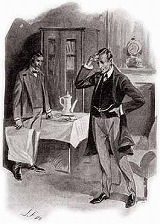“Between nine and ten last night Police-Constable Cook, of the H Division, on duty near Waterloo Bridge, heard a cry for help and a splash in the water. The night, その夜は however, was extremely dark and stormy, so that, in spite of the help of several passers-by, it was quite impossible to effect a rescue. The alarm, however, was given, and, by the aid of the water-police, the body was eventually recovered. It proved to be that of a young gentleman whose name, as it appears from an envelope which was found in his pocket, was John Openshaw, and whose residence is near Horsham. It is conjectured that he may have been hurrying down to catch the last train from Waterloo Station, and that in his haste and the extreme darkness he missed his path and walked over the edge of one of the small landing-places for river steamboats. The body exhibited no traces of violence, and there can be no doubt that the deceased had been the victim of an unfortunate accident, which should have the effect of calling the attention of the authorities to the condition of the riverside landing-stages.”
We sat in silence for some minutes, Holmes more depressed and shaken than I had ever seen him.
“That hurts my pride, Watson,” he said at last. “It is a petty feeling, no doubt, but it hurts my pride. It becomes a personal matter with me now, and, if God sends me health, I shall set my hand upon this gang. That he should come to me for help, and that I should send him away to his death- -!” He sprang from his chair and paced about the room in uncontrollable agitation, with a flush upon his sallow cheeks and a nervous clasping and unclasping of his long thin hands.

“They must be cunning devils,” he exclaimed at last. “How could they have decoyed him down there? The Embankment is not on the direct line to the station. The bridge, no doubt, was too crowded, even on such a night, for their purpose. Well, Watson, we shall see who will win in the long run. I am going out now!”
“To the police?”
“No; I shall be my own police. When I have spun the web they may take the flies, but not before.”
All day I was engaged in my professional work, and it was late in the evening before I returned to Baker Street. Sherlock Holmes had not come back yet. It was nearly ten o’clock before he entered, looking pale and worn. He walked up to the sideboard, and tearing a piece from the loaf he devoured it voraciously, washing it down with a long draught of water.
“You are hungry,” I remarked.
“Starving. It had escaped my memory. I have had nothing since breakfast.”
“Nothing?”
“Not a bite. I had no time to think of it.”
“And how have you succeeded?”
“Well.”
“You have a clue?”
“I have them in the hollow of my hand. Young Openshaw shall not long remain unavenged. Why, Watson, let us put their own devilish trade-mark upon them. It is well thought of!”
“What do you mean?”
He took an orange from the cupboard, and tearing it to pieces he squeezed out the pips upon the table. Of these he took five and thrust them into an envelope. On the inside of the flap he wrote “S. H. for J. O.” Then he sealed it and addressed it to “Captain James Calhoun, Bark Lone Star, Savannah, Georgia.”
“That will await him when he enters port,” said he, chuckling. “It may give him a sleepless night. He will find it as sure a precursor of his fate as Openshaw did before him.”
“And who is this Captain Calhoun?”
“The leader of the gang. I shall have the others, but he first.”
“How did you trace it, then?”
He took a large sheet of paper from his pocket, all covered with dates and names.